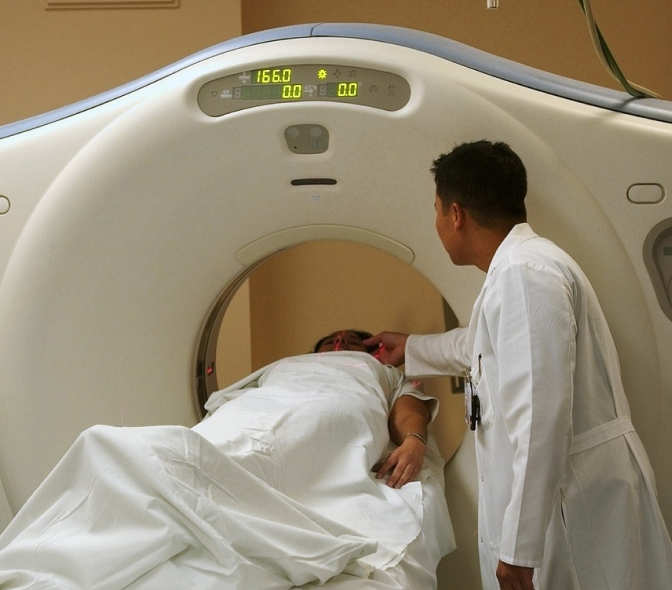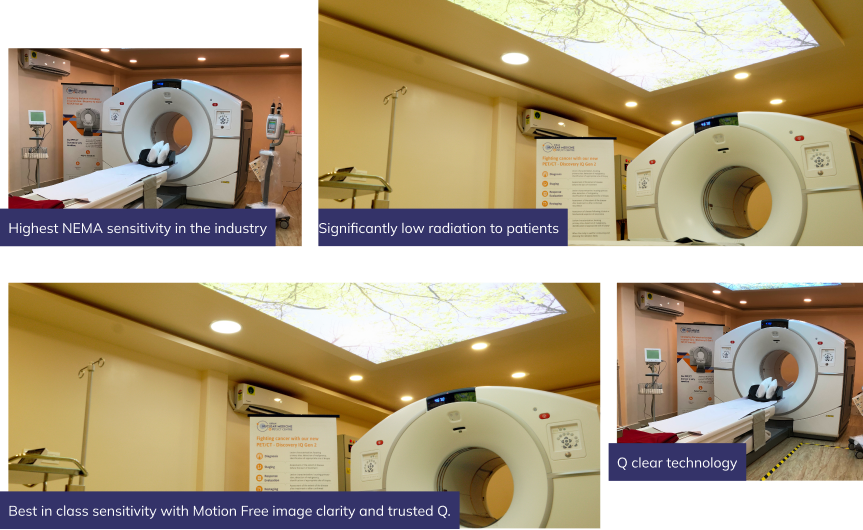Lutetium-177 DOTATATE therapy for neuroendocrine tumor
Home » Lutetium-177 Dotate Therapy
- Experience a whole new world of medicine - Theranostics - at the state of the art facility
- Combine your therapy with imaging for personalized, targeted treatment
- Clean, comfortable and premium isolation rooms which are regularly sanitized
- Pioneers of theranostics in India

What is Lutetium-177 Dotate Therapy?
Who is it For?
- Advanced or Inoperable NETs : When surgery is not an option or the cancer has spread to other parts of the body (metastatic).
- Progressive NETs: For NETs that have grown or recurred after other treatments like surgery or chemotherapy.
- Somatostatin Receptor Positive Scans: A somatostatin receptor PET scan can help determine if a patient s NETs are likely to respond to Lu-177 dotate therapy.
How it Works?
- Dotate Targeting: Dotate is a molecule that specifically binds to receptors for somatostatin, a hormone that helps regulate hormone release. Many NET cells have an abundance of these somatostatin receptors on their surface.
- Lu 177 Attachment: Lu-177, a radioactive isotope that emits short range beta radiation, is attached to the dotate molecule, creating Lu-177 dotate.
- Targeted Radiation Delivery: When Lu-177 dotate is injected into the bloodstream, it travels and binds to somatostatin receptors on NET cells.
- Precise Cell Destruction: The Lu-177 emits beta radiation, effectively damaging and destroying the targeted NET cells while minimizing harm to healthy tissues.

The Next Generation Technology is Here at Kiran PET CT - GE-DISCOVERY IQ GEN 2

Why Choose Us

Pioneering Theranostics
At Kiran Nuclear Medicine and PET CT Center, we're leading the way in theranostics, integrating advanced diagnostics with personalized treatment plans.

Precision and Effectiveness
Our commitment to theranostics means that you receive precise diagnoses and targeted therapies, leading to more effective treatment outcomes. We leverage cutting-edge technology and expertise to deliver the highest standard of care.

Personalized Medicine
We prioritize your individual health needs, providing customized treatment plans that consider your medical history, preferences, and treatment goals.
Meet Our Doctors
Frequently asked questions
Lutetium-177 Dotatate Therapy, also known as Peptide Receptor Radionuclide Therapy (PRRT), is a targeted treatment used primarily for neuroendocrine tumors (NETs) that express somatostatin receptors. It involves the administration of a radioactive isotope, Lutetium-177, coupled with a somatostatin analogue peptide called Dotatate. This combination allows for the selective delivery of radiation to NET cells.
Somatostatin receptors are overexpressed on the surface of neuroendocrine tumor cells. Dotatate is a molecule that binds specifically to these receptors. When coupled with Lutetium-177, a beta-emitting radionuclide, Dotatate acts as a carrier to deliver radiation directly to the tumor cells. The radiation emitted by Lutetium-177 damages the tumor cells, leading to their destruction.
Lutetium-177 Dotatate Therapy is typically recommended for patients with advanced or metastatic neuroendocrine tumors (NETs) that express somatostatin receptors. It may be considered for patients who have progressive disease despite other treatments or who are not candidates for surgery or other therapies.
Lutetium-177 Dotatate Therapy is generally considered safe when administered by trained healthcare professionals in specialized nuclear medicine facilities. However, like any medical treatment, there are potential side effects and risks associated with the therapy, including bone marrow suppression, kidney damage, and radiation exposure to other tissues. Patients will be closely monitored during and after treatment to manage any adverse effects.
Before undergoing Lutetium-177 Dotatate Therapy, patients may undergo imaging studies such as somatostatin receptor scintigraphy (SRS) or positron emission tomography (PET) scans with somatostatin analogues to assess the extent of disease and somatostatin receptor expression. The therapy itself involves the intravenous administration of Lutetium-177 Dotatate, typically as a series of treatments spaced several weeks apart. Patients may experience side effects such as fatigue, nausea, and decreased blood cell counts, which are usually temporary and manageable.
Lutetium-177 Dotatate Therapy has shown promising results in clinical studies, with many patients experiencing tumor shrinkage, symptom relief, and improved quality of life. However, individual responses to the therapy can vary, and not all patients may derive the same benefit. The therapy may also be used in combination with other treatments as part of a comprehensive management plan for neuroendocrine tumors.




